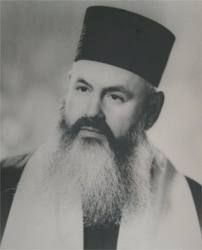A Short Tribute
Hacham Chalom Messas, who would become Chief Rabbi of Jerusalem, was born on 22 Shevat 5669 (1909) in the city of Meknes, Morocco, to Rachel Soudri and Rabbi Maimon Messas – author of Otzrot Shama'im. He was named after his grandfather, who had also officiated as rabbi and dayan in Meknes and wrote Divrei Shalom, a book of Responsa.
Hacham Chalom Messas began studying Torah at a young age, with Rabbi Yitzhak Assebag, his principal teacher. He wrote his first book on Halakha, Memizrach Shemesh, in 1928, when he was 17 years of age. In the introduction, he testifies that "…during my boyhood days, I did not know what a coin even looked like, and all the wealth in the world seemed worthless when compared to the passion of studying the holy Torah." He married Jamila, daughter of Rabbi Moshe Elkrief, and the couple had two sons, David and Abraham.
In 1944, he founded and began to head the Keter Torah yeshiva in Meknes. In 1949, he moved to Casablanca, where he served as dayan. He was elected head of Casablanca's Rabbinic Court in 1962 and subsequently officiated as Morocco's Chief Rabbi.
The exceptional affection King Hassan II had for him was a well-known fact, and when Hacham Chalom Messas would bless the monarch in events at the Royal Palace, the king would bow down.
In 1978 Hacham Chalom Messas immigrated to Israel and took on the position of Jerusalem's Chief Rabbi. He passed away on 10 Nissan 5763 (2003) and was buried in Jerusalem's Har HaMenuhot cemetery.
Hacham Chalom Messas wrote many books during his lifetime, including Memizrach Shemesh – Halakha on prohibitions and permissions, Tevu'ot Shemesh – rulings on the four parts of the Shulchan 'Aruch, Shemesh U'Magen – questions and responsa on daily affairs, Beit Shemesh - on Maimonides' Yad HaHazaka, and Cham HaShemesh – sermons on the Torah.
A few quotes from the Rabbi on 'Traditions of the Fathers'
A few quotes from the Rabbi on 'Torah Study' in which he teaches that a person lacking humility, even if he is a Torah scholar, is not beloved by the Almighty
Our Sages, of blessed memory, instruct us to begin with the Book of Leviticus [Vayikra], specifically, in teaching schoolchildren, so that the issue of humility should be learned first, for it is required for Torah study. A person lacking humility, even if they are a great Torah scholar, is not beloved by the Almighty. That is why there is a small aleph in the word Vayikra: so that pupils may ask why, and teachers can explain, as above, concerning our Master Moses' humility, and that the notion reach the child's mind. This is a fundamental principle in Torah.
VeCham HaShemesh, Part B, Vayikra Torah reading portion, p.358, published by the author, Jerusalem, 2003
A few quotes from the Rabbi on 'Redemption of Israel' The following text is from Rabbi Shalom Massass, written after the murder of Emil Greenzweig, who was killed at a peace rally in Jerusalem:
“To the holy public, to every community and every ethnic group, I turn to you with an agitated and shocked heart, to focus on the unfortunate incident that occurred these past days, which began with ‘brotherly hatred’, and concluded with bloodshed – and continues to shock and horrify the heart. In a similar occurrence, our Holy Temple was destroyed - our glory and exile from our Land should not happen twice. This was the claim of the evil Haman, when he said – ‘there is one People’ – that has now reverted to being scattered and fragmented. Against this, Queen Esther said to Mordechai – ‘Go gather all the Jews’ - let them unite and let all the tribes become One People. And with that, the evil decree was annulled. I turn now to the holy public: Remove all causes of separation, remove the dividing barriers, and banish unfounded hatred from within you. Let us respect one another, let us be level-headed with each other, let us insist upon the morality of man and let us protect the sanctity of life”.
Hacham Shalom Massass, Shamash V’Magen 2nd part, Inyanim Shonim, section 5, page 325, Jerusalem, 1985
